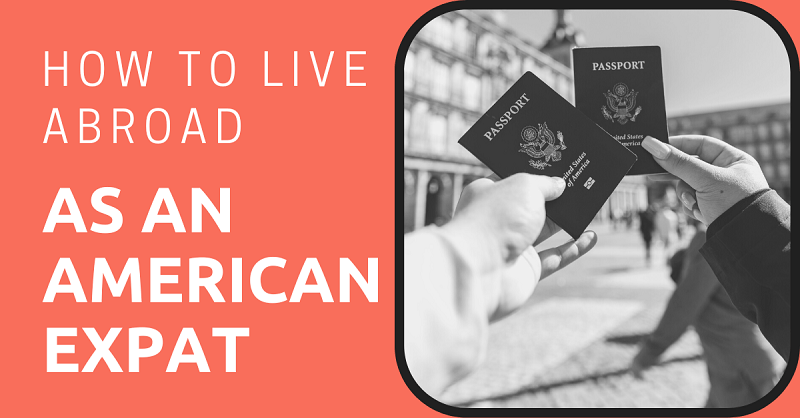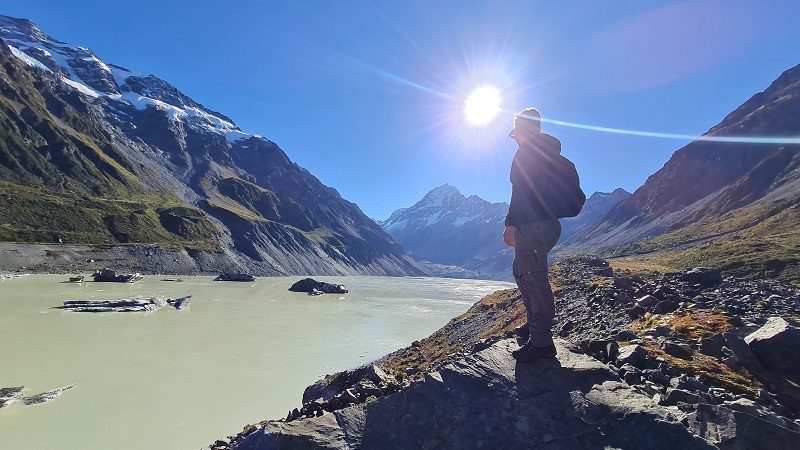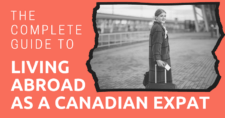
Imagine waking up in a new country, surrounded by unfamiliar sights and sounds. You can’t help but feel a sense of excitement and adventure as you embark on this new chapter in your life.
As an American expat who has lived in several different countries including New Zealand, Poland, and Mexico, I can attest that living abroad can be one of the most rewarding experiences of your life.
But it’s important to remember that becoming an expat isn’t always easy. It can be quite hectic, from navigating the visa process to finding a job and a place to live. That’s where this guide comes in.
Here, I will share my personal experience and expert advice on making the transition to living abroad as seamless as possible so you can focus on what truly matters — making the most of your new life abroad.
This article will take approximately 30 minutes to read. Don't have the time right now? No worries. You can email the ad-free version of the article to yourself and read it later!
Disclaimer: This article may include links to products or services offered by ExpatDen’s partners, which give us commissions when you click on them. Although this may influence how they appear in the text, we only recommend solutions that we would use in your situation. Read more in our Advertising Disclosure.
Contents
Why Live Abroad?
Living abroad as an American expat can be an enriching experience, offering countless opportunities to expand your horizons and grow as a person.
Moving abroad helped me develop new skills and gain valuable experience that gave me a different outlook on life and the world. Some of the most popular reasons Americans choose to live abroad include the following:
Career Advancement
Living abroad gives Americans access to new job opportunities and exposure to different industries. Many Americans may move abroad to manage a business that is expanding to a new country.
Cultural Immersion
Living abroad allows you to fully immerse yourself in a new culture, experiencing its customs, traditions, languages, and way of life in a way that simply isn’t possible as a tourist. For me, this was a truly transformative experience that broadened my perspective and enriched my life.
Adventure
For many Americans, living in a new country is an opportunity to embark on an adventure. It’s a chance to step out of your comfort zone, push yourself beyond your limits, and see the world in a new way.
Language Learning
Living in a country where a different language is spoken can be an excellent opportunity to learn a new language. It’s easy to get comfortable and try to get by with just English. But learning a new language is helpful in day-to-day communication and opens up a whole new world of literature, films, and music.
Cost of Living
Some Americans choose to live abroad to stretch their dollars further. In some countries, the cost of living is much lower than in the United States, so even if you make the same amount of money or less as you did in the U.S., you’ll have a better quality of life.
Related articles:
- Cost of Living in Thailand as an Expat: How Much Do You Need Per Month? (2023)
- Cost of Living in Costa Rica: How Much Do You Need Per Month? (2022)
- Cost of Living in Vietnam as an Expat: How Much Do You Need Per Month? (2022)
- How Much You Need to Live in Mexico as an Expat in 2022
What Is Life Like For American Expats?
Over the past decade, I’ve lived in New Zealand, Poland, Mexico, Thailand, and Indonesia. As an American expat, my life is a unique blend of the familiar and the foreign. On the one hand, I’m surrounded by the customs and culture of the country I now call home.
On the other hand, I’m constantly reminded of my American heritage through the small things, like the taste of a good hamburger or the sound of a familiar accent.
One of the things many Americans love the most about living abroad is the opportunity to travel to new and exciting places. I’ve been able to visit historical sites, natural wonders, and cultural landmarks that I would never have had the chance to see if I’d stayed in America.

The people I’ve had the opportunity to meet while living abroad are also more diverse. I have made friends from all over the world, and it has been a wonderful experience to learn about different cultures and perspectives.
Furthermore, living abroad as an American expat has also made me more open-minded and adaptable. I’ve come to realize that there is no one “right” way to live and that there is always something new to learn from other cultures.
It’s a constant journey of self-discovery, and I wouldn’t have it any other way.
Work Opportunities
Finding work can be both an exciting and daunting task. But with the right preparation and mindset, you can secure a great job and make the most of your time abroad. I highly recommend finding a job before setting off on your adventure abroad.
It can sometimes take a while to set up the work visa and contracts, and you don’t want to dig into your savings while you wait.
Popular jobs for American expats include teaching English, working in international business, and hospitality. Many American expats also find work in the technology and finance sectors, especially if they have specific skills and experience in those fields.
Finding work abroad is a mixture of making personal connections and using the Internet to find jobs for expats.
The first place I moved to from the U.S. was Poland. I initially volunteered at a hostel using Workaway in exchange for free food and accommodation. Eventually, the company offered me a work contract, and I was able to get a residency visa.
While living abroad, I’ve also taught English in private lessons, at various summer camps, and even at schools. This is the most popular and easiest type of job to get for American expats.
Here are some excellent websites to check out for finding work abroad:
- Go Abroad: This site is primarily focused on English teaching jobs for both in-person and online work.
- Indeed: Indeed has a worldwide job network, so you can search for jobs in various countries around the world.
- Eurojobs: Great website with thousands of jobs for expats (and residents) in Europe.
- Seek Australia and New Zealand: If you plan to live in Australia or New Zealand, you should look for jobs on Seek. This site has hundreds of job opportunities for each country.
- Buscojobs: This is a massive job network for South and Central America, with thousands of job postings in various Latin American countries.
In order to secure a good job, it’s essential to do your research in advance. Learn as much as possible about the job market in your destination country, and find out what qualifications and skills are in demand.
Network with other American expats, and reach out to companies and organizations you’re interested in working for. Learning the local language is also a good idea, making communicating with potential employers and navigating the job market easier.
Also, speaking the local language is sure to be a gold star on your resume for employers.
Another important step is updating your cover letter and resume to highlight the experience and skills most relevant to the job you are applying for. Don’t be afraid to be creative and think outside the box.
If you want more freedom to travel and live a digital nomad lifestyle, starting your own business or freelancing might be a good option. This can be a great way to leverage your skills and experience while also allowing you to explore your new surroundings.
With many U.S.-based jobs moving to remote contracts, many Americans are also moving abroad while keeping their American jobs. Just research the time difference with the country you are moving to, as you may end up working at 3 AM.
Here is a list of a few major U.S. companies that offer remote contracts:
- TTEC
- Sutherland
- TranscribeMe
- Amazon
- Microsoft
- Slack
Related articles:
- An Expat’s Guide to Finding Work in Mexico
- An Expat’s Guide to Finding Work in Indonesia
- An Expat’s Guide to Finding Work in Thailand
- An Expat’s Guide to Finding Work in China
- An Expat’s Guide to Finding Work in Singapore
Healthcare
Every American expat needs to work out where they stand with healthcare in the country they live in. This is especially important as most American insurance companies don’t usually cover medical expenses incurred abroad.
Travel Insurance
One of the first things I did when I moved abroad was purchase travel insurance. I use SafetyWing, which has affordable coverage for those who travel often.
This insurance is sort of a bare minimum coverage for any medical emergencies that may occur while outside of the U.S.
However, I changed to a more comprehensive health insurance plan after I set up my life in a new country.
US Insurance
Another option for Americans living abroad is to use their American insurance.
This can be a good option if you’re planning to return to the U.S. in the near future or if you want to ensure that you have access to care from American doctors and hospitals.
However, these aren’t the best options, especially if you’re permanently or semi-permanently moving abroad.
The exception is U.S. insurance companies that offer plans specifically for expats, such as Cigna Global and GeoBlue. You should check them out if the country you’re living in doesn’t have a good public healthcare system.
Use Healthcare In Your Host Country
One thing about healthcare that surprises most Americans is the socialized healthcare systems.
For example, expats (or even tourists) in the U.K. have access to some or all of the benefits of the National Health Service (NHS). In other countries, residents or work visa holders must simply apply for socialized healthcare and will receive free or discounted care options.
Since I don’t live in the U.S. anymore, I don’t have U.S. insurance. It just wouldn’t make sense to me. I currently live in New Zealand, where healthcare is incredibly affordable for residents.
All I have to do is call my doctor’s office if I want an appointment and pay $20 out of pocket. The rest is covered by the government.
These systems vary from country to country, but they typically provide access to basic medical care at a relatively low cost. In some cases, expats may be required to pay a small monthly fee to access the healthcare system, while in other cases, they may be required to pay a small percentage of their income in the form of taxes.
For example, when I lived in Poland, I paid higher taxes than in the U.S. (around 30 percent) but a portion of my taxes covered my healthcare, so I could access free doctors’ appointments, hospital visits, x-rays, ambulances, etc.

However, if you’re planning to live in a country where English is not the primary language, I would definitely recommend looking into private insurance.
This usually ensures that you get a doctor who speaks English, and there won’t be a miscommunication about your health. Ask your employer about private healthcare, as many jobs abroad will offer expats private insurance at a discounted rate.
Overall, navigating the healthcare system as an American expat can be challenging, but it’s also an opportunity to learn about new systems in the country you plan to move to ensure that you have access to the care that you need.
How about Medicare and Medicaid?
If you’re on Medicare or Medicaid, you will likely need to change your insurance, as these programs don’t typically cover overseas medical bills.
Learn more: The Ultimate Expat Guide to Getting Health Insurance Abroad
Taxation
As an American expat, you may be in for a surprise regarding taxes. Even if you’re living in a foreign land and paying taxes over there, the IRS is still keeping an eye on you.
All American citizens, regardless of what country they may live in, must file a tax return with the IRS every year. So, if you’re working abroad, you must not only navigate taxes in another place but also keep up with your U.S. taxes.
But fear not — this doesn’t automatically mean you’ll be paying double taxes. One of the best ways to minimize your tax liability as an expat is to take advantage of foreign income exclusions and foreign tax credits.
These can reduce your tax burden and potentially even wipe it out completely. You’ll have to apply for these tax credits after filing your taxes with the IRS, and generally, you won’t have to pay any tax to the IRS.
Another way to ensure you’re meeting your tax obligations as an expat is to work with a tax professional experienced in dealing with expat tax issues. This is how I personally deal with my taxes.
International tax treaties can be a huge headache to sift through, and since I’m an independent contractor, the taxes get even more confusing.
I’m by no means a tax expert, so these professionals can help me navigate the complexities of the tax code, stay compliant, and ensure that I’m taking advantage of all the deductions and credits available.
Still a bit confused? I don’t blame you. Here’s a complete guide on filing U.S. taxes while living abroad.
When you choose a tax adviser, you should use the one that knows both American taxes and the tax system of the country you’re living in. I don’t have a personal recommendation on which tax adviser you should use, but many of them are available on TurboTax.
Preparation
Moving abroad can be an exciting but also overwhelming experience. There are many things to consider and prepare for before making a move.
Here are a few key steps to take to ensure a smooth transition to your new home. These are tips I wish I’d known before I started my life abroad.
Research the Country and Culture
Before moving abroad, you must familiarize yourself with the culture and customs of the country you’ll be living in. This will help you understand the new environment more easily.

Research local laws, customs, and social norms to avoid cultural faux pas.
Visa and Residency
The second thing you need to do is to check the visa requirements of the country you’re moving to. Every country has different rules and regulations, and it’s vital to ensure you have the proper visa before arriving.
Some countries may also require you to apply for residency once you’re there. Make sure you understand the process and what documents you need to provide.
Learn the Language
Learning the local language will make it much easier for you to communicate with locals and navigate daily life in your new home.
Even if you’re not fluent, having basic conversational skills will go a long way in helping you feel more comfortable and connected to your new community.
Learn more: The Complete Expat Guide for Learning a New Language
Get Your Paperwork in Order
Moving abroad requires a lot of paperwork, so it’s crucial to gather the necessary documents as early as possible. This includes getting your academic or employment documents, lease agreement, job contract, medical records, etc.
Also, make sure to update your contact information with your bank, credit card companies, and other vital organizations.
Save Some Money
Living abroad can be expensive, so it’s important to budget and figure out how much you’ll need to cover your expenses. Consider the cost of housing, food, transportation, and any other expenses you’ll have.
Learn more: Best Ways to Send Money Abroad
Find a Place to Live
Finding a place to live is one of the most important things to do before moving abroad. Research different neighborhoods, and try to find a place close to your work or school and in a safe area.
Things to Do in Advance
Before moving abroad, there are a list of important things you should take care of.
Get Health Insurance
Make sure to check your insurance coverage, and if it doesn’t cover you abroad, consider getting additional insurance. Also, be aware of the medical services and facilities available in your new location.
Set Up a Bank Account
Before you move, you’ll need to sort out your banking and finances. This includes opening a bank account in your new country and closing any accounts you have in the U.S. You’ll also need to make sure you have a credit or debit card that’ll work abroad and find out if you can access your U.S. bank accounts from your new location.
Pack Smart
Pack smart for your move and only bring the things you need. Consider the climate and culture of your new home, and pack accordingly. This can be a bit of a hassle, but it’s worth ensuring you have everything you need when you arrive.
Notify Friends and Family
Let your friends and family know your new contact information and address so they can stay in touch with you. It’s also important for your security.
Contact Your Phone Provider
You’ll need to either cancel your U.S. phone number and get a local number in the country you live in or talk to your provider about international options. Some U.S. phone providers have international phone plans, so check with your company.
Set Up Your New Mailing Address
Once you leave the U.S., you’ll have to sort out where your mail will go.
For important U.S. mail, such as tax documents, I recommend having your mail sent to a U.S. address of a close friend or family member, as sending mail abroad from the U.S. can take weeks. So, urgent and important mail should be sent to a local address.
Best Places to Live Abroad as an American
There are many countries in the world that are great places for Americans to move to. Each place has a unique charm and offers a different lifestyle. From vibrant cities to the tranquil countryside, it can be hard to choose where to settle down.
I’ve done some of the work for you and narrowed down a list of some of the best places to live abroad as an American.
This is based on my own experience and the experiences of my expat friends and acquaintances.
Mexico
Mexico is a fantastic destination for tourists and expats alike. From historic cities to tropical rain forests, volcanoes, beaches, and amazing food, you’re sure to find a place you can call home in this country just south of the U.S.
Visas
Over 1 million American expats live in Mexico. An American expat planning to live in Mexico for an extended period should choose the correct visa. A U.S. citizen can enter and live in Mexico for up to 180 days without getting a visa, but it comes with conditions.
The Temporary Resident Visa is the most suitable for expats. This visa is commonly used by those employed in Mexico and their dependents and is intended for those who’ll be staying in the country for more than six months but less than four years.
Learn more: The Complete Guide to Mexico Visas for US Citizens
What’s Great
Mexico is a truly captivating country with a lot to offer for expats. Here are some of the great things Mexico has to offer:
- Mexican people are warm and hospitable
- delicious and flavorful food
- affordable cost of living
- balance of modern conveniences and laid-back lifestyle
- strong expat community for connections and support
- close to home; only a short and affordable flight from most major airports in the U.S.
What’s Not so Great
Some challenges you can face in Mexico include the following:
- language barriers can make communication and accessing essential services difficult
- bureaucratic procedures can be frustrating and time-consuming
- healthcare systems may be less developed with limited options for treatment
- air and water pollution can be an issue in some areas
- crime can be a concern in some areas, particularly in larger cities
Related articles:
- How to Move to (and Survive in) Mexico
- How Much You Need to Live in Mexico as an Expat in 2022
- The Complete Guide to Renting an Apartment in Mexico City
- Health Insurance in Mexico for Expats: What You Need to Know
Thailand
Thailand has an incredibly low cost of living, some of the friendliest people on the planet, and delicious food.
The country is also ranked as the best place for expats in Southeast Asia. So, Americans looking for a different place to live may fall in love with this country.
Visas
When embarking on the journey of making Thailand your new home, it’s important to understand the visa process. You can apply for a 90-day visa that can be easily extended through Thai immigration.
One of the unique aspects of working in Thailand is that it’s the employer’s responsibility to file an application for the employee’s work permit.
And once the work permit is obtained, you’ll be able to legally work and live in the beautiful country of Thailand.
Learn more: The Complete Guide to Thailand Visas for US Citizens
What’s Great
Thailand can undoubtedly provide everything you’re looking for in your second home, including the following:
- low cost of living compared to the U.S.
- friendly and welcoming local culture
- rich history and beautiful temples
- warm tropical climate
- abundant outdoor activities such as hiking, swimming, and diving
- vibrant nightlife and entertainment
- good healthcare options available
- strong expat community for support and networking
What’s Not so Great
Be ready for the following challenges while in Thailand:
- traffic congestion in major cities
- limited job opportunities for foreigners
- limited public transportation options
- different cultural norms and customs may take time to get used to
- occasional political instability
- limited access to certain brands and products commonly found in the U.S.
- weather and rainfall can be extreme during certain months of the year
Related articles
- Moving To Thailand: A Guide for Expats to Live Here
- Health Insurance in Thailand: What You Need to Know as an Expat
- The Company Registration Guide in Thailand for Foreigners
- An Expat’s Guide to Finding Work in Thailand
Costa Rica
Costa Rica is a very popular destination for Americans and other foreign nationals to move to. The nature, laid-back atmosphere, and high standard of living make Costa Rica one of the best expat destinations in Latin America.
Visas
U.S. nationals don’t need a visa to enter Costa Rica as long as their visit is for 90 days or less. However, for expats, Costa Rica offers temporary residency, which can be converted into permanent residency after three years.
You can find all the information at the nearest Costa Rican embassy.
Learn more: A Complete Overview of Costa Rica’s Visa Requirements
What’s Great
Are you thinking about moving to Costa Rica? Good choice. Here are some of the great things about this beautiful country:
- abundant natural beauty and biodiversity
- stable political and economic environment
- friendly and welcoming local culture
- strong expat community
- good healthcare options available
- low cost of living compared to the U.S.
- good opportunities for part-time jobs and self-employment
- high standard of living
- tax laws that are favorable to foreigners
What’s Not so Great
Just like any other country, Costa Rica has its drawbacks, too. Here are some of them:
- limited job opportunities for foreigners
- language barriers, as not many locals speak fluent English
- occasional crime and safety concerns in some areas
- natural hazards such as hurricanes and earthquakes
- high humidity and heat in certain areas
- higher cost of living than other countries in Central America
- possibility of dealing with insects, bugs, and other pests
Related articles:
- Moving to Costa Rica: A Guide for Expats to Live Here
- Cost of Living in Costa Rica: How Much Do You Need Per Month?
- My Experience with Living in Costa Rica as an American Expat
- Retiring in Costa Rica: The Complete Guide
New Zealand
New Zealand’s natural beauty, high standard of living, and similar culture make it an attractive place for American expats. This small country has many foreign nationals from the U.S., Canada, Australia, the U.K., and Ireland, so it is very welcoming to expats. The country is also relatively easy to immigrate to.

Visas
The work to residence visa program in New Zealand provides an opportunity for expats to not only work in the country but also to potentially call it home after just two years. To qualify for this program, individuals must possess skills in high demand by New Zealand employers or exceptional talent in specific fields.
Before embarking on your journey to a new country, it’s crucial to conduct thorough research to identify the visa that best suits your needs.
What’s Great
New Zealand is a country with many appealing features for expats. In short, you can’t go wrong if you choose New Zealand.
- stunning natural landscapes, including mountains, beaches, and lakes
- safe and stable political and social environment
- high standard of living
- multicultural and welcoming society
- good healthcare and education system
- variety of outdoor activities such as hiking, skiing, and adventure sports
- high level of personal freedom and individual rights
- strong emphasis on environmental preservation
- wide range of job opportunities, especially in technology, tourism, and agriculture
- work to residence visa program that allows expats to apply for a resident visa after two years
What’s Not so Great
Some minor challenges you might face while living in New Zealand include:
- high cost of living compared to the U.S.
- limited public transportation options in certain areas
- limited housing options and high prices for some areas
- weather can be extreme during certain months of the year
- limited nightlife and entertainment options in some areas
- remote location; makes travel to other countries more difficult and expensive
Related articles:
- The Complete Guide to Moving to New Zealand from the US
- The Complete Guide to Medical and Private Health Insurance in NZ
Spain
Spain is one of my favorite places in Europe. The country boasts mild winters, great food, welcoming people, and lively culture. Expats living here will feel at home instantly and are sure to find a group of like-minded people to call friends.
Life slows down in Spain, and Americans may be surprised by the laid-back working culture and, of course, the mid-day nap — the siesta.
Visas
As of May 2023, U.S. citizens who plan to visit Spain for tourism, study, or business will need to apply for a visa waiver called ETIAS.
If you’re planning on moving to Spain for a more extended period, it’s important to choose the right visa category to avoid any inconvenience. Spain has many visa categories, with work visa being the most suitable for U.S. expats. The country is also planning to drop a digital nomad visa for those who have a remote job outside of Spain.
What’s Great
With its fantastic weather, rich culture, and friendly people, it’s no wonder why so many expats choose to call Spain their new home.
- sunny weather, beautiful beaches, and a relaxed way of life
- warm and welcoming people, known for sociability and love of good food and drink
- Spain offers a diverse range of landscapes perfect for tourism
- low cost of living compared to other European countries
- well-developed infrastructure, with good transportation links and a high standard of living
What’s Not so Great
You might have to deal with the following issues if you plan on living in Spain:
- language barriers can be a challenge for non-Spanish speakers
- intense summer heat in some areas
- traffic congestion in larger cities
- competitive job market in certain industries
- culture shock and adjustment to a different way of life can be challenging
Related articles:
- Moving To Spain: A Guide for Expats to Live Here
- Opening a Bank Account in Spain: A Guide for Expats and Tourists
- Cost of Living in Spain as an Expat: How Much Do You Need Per Month?
Are There any Downsides?
I would be lying if I said living abroad as an American was all good. Living abroad may seem like a dream come true, but let’s be real — it’s not all sunshine and rainbows.
As an American expat, I’ve encountered my fair share of challenges, but that’s all part of the adventure.
Dealing with Homesickness
Being away from friends and family and the comforts of your own country can be difficult. Homesickness sets in every so often as you have to choose which family gatherings, weddings, and birthdays to fly home for and which ones to miss out on.
Navigating Different Tax Laws and Regulations
One of the biggest challenges I’ve faced is understanding the tax laws and regulations in the country where I’m living. Unfortunately, American expats must file taxes in both the country they reside in and the U.S.
So, it’s important to stay informed about these laws, as they can significantly impact your tax liability. More on this later.
Keeping Up with Cultural Differences
Living in a foreign country can be a culture shock. I’ve had to adjust to different customs, manners, and even ways of communication.
But I found that embracing cultural differences has been one of the most rewarding experiences of my journey.
Maintaining Relationships Back Home
Being an expat can be lonely at times, especially when you’re far away from your loved ones. I’ve had to make an extra effort to stay connected with my family and friends back home, and it’s not always easy.
Dealing with Language Barriers
While many people worldwide speak English, it’s not the primary language of most countries. So, many American expats struggle with the language barrier in the country they live in. Learning even a little bit of the local language can go a long way.
Overall, being an American expat has its challenges, but it’s also a rewarding and enriching experience. It’s all about finding a balance, being adaptable, and having a positive attitude.
Now, on to You
No matter where you’re considering moving to, it’s important to weigh the pros and cons of each location. I’ve highlighted some of the key factors to consider when making the decision to live abroad, from the cost of living and job opportunities to cultural differences and quality of life.
However, it’s important to keep in mind that the most important factor is whether the country aligns with your personal goals and preferences. With the right mindset, research, and preparation, living abroad as an American can be an experience of a lifetime.
It can broaden your perspectives, open your mind to new cultures and ways of life, and make you more adaptable to different situations. It’s a journey that will not only change you but also make you grow as an individual.







